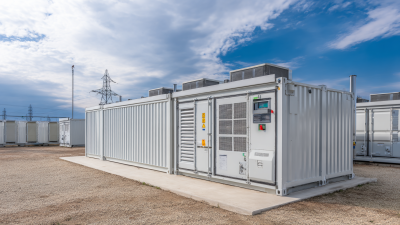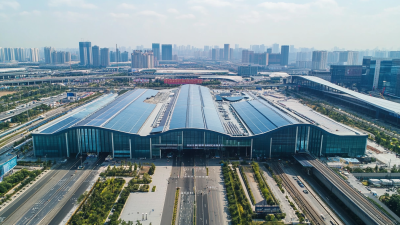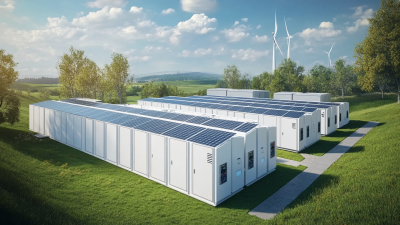 In recent years, the demand for efficient and sustainable energy solutions has surged, with a particular focus on residential energy storage systems. According to a report by the International Energy Agency (IEA), the global battery storage market is expected to grow exponentially, reaching a capacity of over 1,000 GWh by 2040.
Among various options available, 5KW Battery Storage emerges as a game changer for homeowners seeking to optimize their energy management. By enabling the storage of excess energy generated from renewable sources, such as solar panels, this technology not only enhances energy independence but also facilitates lower electricity bills and greater resilience during power outages.
The integration of 5KW Battery Storage into home energy systems promises not just immediate benefits, but also supports wider efforts toward a sustainable energy future, aligning with the goals outlined in recent corporate sustainability reports from leading energy firms.
In recent years, the demand for efficient and sustainable energy solutions has surged, with a particular focus on residential energy storage systems. According to a report by the International Energy Agency (IEA), the global battery storage market is expected to grow exponentially, reaching a capacity of over 1,000 GWh by 2040.
Among various options available, 5KW Battery Storage emerges as a game changer for homeowners seeking to optimize their energy management. By enabling the storage of excess energy generated from renewable sources, such as solar panels, this technology not only enhances energy independence but also facilitates lower electricity bills and greater resilience during power outages.
The integration of 5KW Battery Storage into home energy systems promises not just immediate benefits, but also supports wider efforts toward a sustainable energy future, aligning with the goals outlined in recent corporate sustainability reports from leading energy firms.
The rise of renewable energy sources has prompted homeowners to seek effective energy storage solutions, and a 5KW battery storage system stands out as a transformative option. One of the primary benefits of this technology is its ability to store excess energy generated during peak sunlight hours, allowing homeowners to use this energy at night or during cloudy days. This not only maximizes the efficiency of solar power systems but also significantly reduces dependency on the grid, leading to lower electricity bills.
Furthermore, investing in a 5KW battery storage system increases energy independence. Homeowners can effectively manage their energy consumption and optimize usage during peak demand hours, when electricity costs are highest. Additionally, in cases of power outages or emergencies, the stored energy provides a reliable backup source, ensuring that essential appliances remain operational. As energy costs rise and the demand for sustainable living solutions increases, the 5KW battery storage system offers an attractive and practical way for homeowners to take control of their energy future.
When comparing 5KW battery storage systems to traditional energy solutions, the cost-effectiveness emerges as a crucial factor for homeowners. Initially, the upfront investment for a 5KW battery may seem significant. However, in the long term, it offers substantial savings by reducing reliance on grid electricity and mitigating peak demand charges. Many households are increasingly susceptible to fluctuations in energy prices, but a 5KW battery system allows for the harnessing of renewable energy sources, such as solar power, during peak generation times, thus stabilizing energy costs over time.
Moreover, traditional energy solutions often involve recurring costs, including various fees and rates imposed by utility companies. In contrast, 5KW battery storage systems provide a level of independence, enabling homeowners to store excess energy for later use. This not only promotes financial savvy but also supports sustainability efforts by optimizing energy consumption. Ultimately, as energy markets continue to evolve, the financial benefits of investing in a 5KW battery system represent a significant shift toward more resilient and cost-effective home energy solutions.

The performance of 5KW battery systems is becoming increasingly crucial as homeowners seek efficient energy solutions. Recent studies indicate that advanced battery technologies significantly improve power density and system efficiency, which are essential for maximizing energy storage capabilities. For instance, the integration of high-performance polymer electrolytes has shown to enhance water and heat transport characteristics, leading to improved overall battery performance. This means that 5KW battery systems can deliver higher energy outputs while maintaining optimal efficiency, making them ideal for residential applications where energy demands fluctuate.
Additionally, the growth of smart energy management systems paired with 5KW battery storage allows homeowners to optimize their energy usage. Reports suggest that using a 5KW battery can reduce peak energy consumption by up to 30%, which not only lowers electricity bills but also contributes to a more sustainable energy footprint. With continuous advancements in battery technology and system design, the impact of 5KW battery storage on home energy solutions is profound, offering a reliable and efficient method to harness renewable energy sources.
The transition to renewable energy sources has catalyzed a growing demand for efficient energy storage solutions. A 5kW battery storage system offers homeowners an effective pathway towards energy independence and sustainability. According to the International Energy Agency (IEA), residential energy storage is poised to grow by over 40% annually over the next five years, as more households look to store excess solar energy generated during the day for use at night or during peak demand hours. By utilizing a 5kW battery system, homeowners can significantly reduce reliance on the grid, particularly during high-cost peak times.
In addition to the financial benefits, the environmental impact of widespread battery storage adoption cannot be overstated. The U.S. Department of Energy states that integrating battery storage with renewable energy can lead to a reduction of carbon emissions by up to 80% in the residential sector. This not only supports personal sustainability goals but also contributes to a larger shift towards a greener grid. As more homeowners invest in 5kW battery systems, the collective move towards energy independence strengthens the resilience of local energy infrastructures, paving the way for a more sustainable future.

As energy demands continue to rise, the scalability of home energy solutions becomes increasingly vital. A 5KW battery storage system provides a flexible framework that can easily adapt to the changing needs of households. Whether you're powering a small apartment or a large family home, the modular nature of these systems allows for easy expansion. This means that you can start with a single unit and add more capacity in the future as your energy requirements grow, ensuring that you never outgrow your energy solution.
Moreover, future-proofing is another significant advantage of 5KW battery systems. As technology advances, so too does the efficiency and capacity of battery storage. By investing in a scalable battery solution today, homeowners can benefit from upgrades and improvements down the line without the need to replace their entire system. This adaptability not only maximizes the initial investment but also aligns with shifting energy policies and advancements in renewable sources, ensuring homeowners are always prepared for what lies ahead in the energy landscape.
| Reason | Description | Benefits | Potential Savings |
|---|---|---|---|
| Increased Energy Independence | 5KW battery systems allow homeowners to store excess energy generated from renewable sources. | Reduced reliance on the grid. | Up to 30% reduction in energy bills. |
| Scalable Solution | Devices can easily be upgraded or expanded with additional batteries as energy needs grow. | Tailored to individual energy usage. | Customizable potential savings. |
| Enhanced Resilience | Provides backup during power outages, ensuring uninterrupted power supply. | Increased home safety and comfort. | Potential loss avoidance during outages. |
| Future-Proofing | Supports evolving energy needs and adoption of smart technologies. | Long-term investment for energy efficiency. | Increased home value through energy efficiency. |
| Environmental Impact | Reduces carbon footprint by maximizing renewable energy usage. | Contributes to sustainability goals. | Not quantifiable but enhances community reputation. |
| Smart Home Integration | Compatibility with home automation systems for optimized energy management. | Improved convenience and energy control. | Varies based on implementation. |
| Cost-Effectiveness | The drop in battery prices combined with tax incentives makes 5KW solutions affordable. | Greater accessibility for homeowners. | Potential payback period of 5-10 years. |





